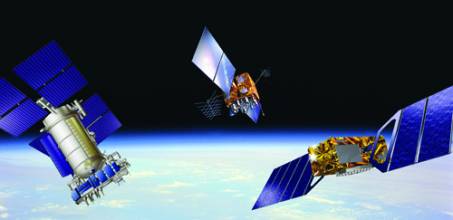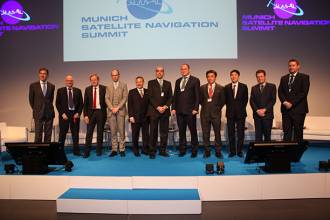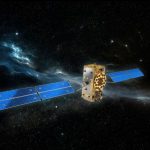Europe’s space community rang in the New Year with two of its brightest annual fixtures: the European Union (EU) Space Policy conference in Brussels and the European Space Agency (ESA) media briefing in Paris.
The events brought out all of the relevant voices and served to illustrate not only the disposition of materiel and troops but also their intent and even the level of morale.
Europe’s space community rang in the New Year with two of its brightest annual fixtures: the European Union (EU) Space Policy conference in Brussels and the European Space Agency (ESA) media briefing in Paris.
The events brought out all of the relevant voices and served to illustrate not only the disposition of materiel and troops but also their intent and even the level of morale.
Insights from ESA briefing can be found in a news article in the “360 Degrees” section here. Here we will focus on the broad range of personalities and sentiments expressed at the Brussels event.
Elżbieta Bieńkowska, the EU Commissioner for Internal Market, Industry, Entrepreneurship, and SMEs (DG-GROW), i.e., the “Space Commissioner,” opened the Space Policy conference with good news about Galileo. After a troubled 2014, she said, 2015 turned out much better.
“In 2015, we did indeed launch, as we said we would the last time we were here, six new Galileo satellites, doubling the number of satellites now into orbit.”
The European Commission (EC) will continue to build Galileo in 2016, striving for a speedy deployment schedule, including another batch of satellites that will enable the launch of initial services before the end of the year.
“This is a challenge, but I count on ESA to make it happen,” Bieńkowska said.
So, if it doesn’t happen, we all know whose fault it is.
Galileo, Bieńkowska said, is not just an infrastructure; the EC is working to ensure that citizens get the full benefits, by promoting greater private and public uptake, with space data and apps expected to proliferate into many fields. And the commission will also work to identify and exploit synergies with the defense community.
All of which fits in nicely with Bieńkowska’s new main priority in the space arena — the EC’s 2016 European Space Strategy initiative. Although details are still fuzzy, the general idea seems to be to come up with “an ambitious strategy” to promote innovation and competitiveness in this key sector, to be adopted in the fall of 2016. Of course, it will encompass all of the EU’s space initiatives, not just Galileo.
“We will not develop the Strategy in isolation,” Bieńkowska said. “The coming months will feature a broad consultation process, and you are all invited to participate, starting today.”
And Bieńkowska repeated her call for improved governance, something we found surprising when she said it last year, coming, as it did, on the heels of a major governance breakthrough for the EC-ESA-GSA triangle.
This time she elaborated.
“Governance is not an end in itself; it is about how it allows us to deliver benefits.”
By governance, we understand, she probably means cooperation among all the governing bodies, including national agencies, and, again, not just with respect to the Galileo program. “We must recognize the increasing role of the EU in space strategy,” Bieńkowska concluded.
Many themes and topics were covered at the Brussels event, and some recurring threads emerged, including, of all things, the importance of culture.
But first, a bit more on the nuts and bolts of Galileo.
Matthias Petschke, director of EU Satellite Navigation Programs at DG-GROW said the “recovered” satellites 5 and 6, the ones launched into anomalous orbits in 2014, will ultimately serve a useful purpose, perhaps in relation to the Galileo search and rescue (SAR) service. “We are not writing them off,” he assured his audience.
He also reported good progress on the Galileo ground segment and repeated Bieńkowska’s announcement of initial services this year, including the Public Regulated Service (PRS). The much-anticipated Commercial Service (CS), however, is not likely to be ready, Petschke conceded, and indeed the details of how it will work have yet to be finalized.
We do know one thing relating to CS, he said. “On the user side, we see a big demand for authentication, for trusted PNT, and this will be a key element for new pay-as-you-go services like road charging.”
Culture Counts
“Culture,” with a capital C, and a diversity of it, are defining characteristics of the European character. Proof: although English was the working language at Space Policy event, a fair number chose to address the conference in the more poetic language of Molière, slightly fewer in Italian or German.
The Europeans remain rightly interested in who they are, and in being who they are, particularly in relation to the United States. Here are just some of the things people were saying about Europe, who and what it is, and who it isn’t:
Monika Hohlmeier, chair of the European Parliament’s Sky & Space Intergroup, said, “In America, they act first, then see what happens. Here in Europe, we think first and then talk a lot before we do anything.”
François Auque, head of Space Systems at Airbus Defence and Space, said, “Traditionally, culturally, we are terrified of failure. But today we are realizing that failure is acceptable.”
Michel de Rosen, president and CEO of Eutelsat, said, “Europe must lead, but Europe must also learn. The U.S. Department of Defense knows sovereignty is not the enemy of private sector, including private satellite operators. Europe needs to learn this too.”
Marco Fuchs, CEO of Galileo satellite builder OHB, urged, “We need to dare to start new projects. We shouldn’t be talking about just using Galileo. We need to be looking towards the next big project.”
Member of European Parliament Cora van Nieuwenhuizen also referenced, in her own way, Europe’s fear of failure, and its result: “We have a problem in Europe with venture capital. We put a lot of investment into start-ups — but as much as we do, they end up in Silicon Valley anyway.”
Maroš Šefčovič, European Commission vice-president, spoke about daring to look ahead: “I just heard something about US legislators who are discussing passing new laws to cover space mining, understanding that one day it will be cheaper to bring raw materials home from space than to bring them up from bottom of the sea. That’s looking ahead and this is the kind of visionary approach we need in Europe.”
Jean-Yves Le Gall, president of France’s CNES, drew the conference’s attention to the unexpected passing, just a day earlier, of the British musical artist David Bowie, who’s portrayal of an astronaut in his classic song ‘Space Oddity’ inspired millions. The mention of Bowie drew an unusual and heart-felt round of applause from the room. The Europeans do, after all, know good culture when they see it (or hear it).
Finally, Lowri Evans, the European Commission’s new Director-General of DG-GROW, being very much in touch with who and what she is, called out “Welsh!” when Parliament Vice-President Antonio Tajani imprudently referred to her as “English.” Talk about a “faux pas!”
Explain That?
Europe is a diverse place, and so it can be misleading to pretend that there is a single unitary European culture at all. But we might generalize, and many did at the Brussels conference, about the effectiveness of the communication practices among the European space community.
Thierry Mandon, France’s Minister of State for Higher Education and Research, said, “In space, Europe is world class, not just in engineering and technologies but also in the work of our institutions. But we need to tell our European success stories, like Galileo and Copernicus, better than we are doing now. We need to encourage our students, turn opinion, and sell our space programs.”
Jerzy Buzek, distinguished chair of the European Parliament’s ITRE Committee, also stressed to need to communicate more effectively: “We need to explain space to our public opinion. If we need more money, we need to say why.”
Buzek saluted Johann-Dietrich Wörner, the new Director General of the European Space Agency (ESA), referring to one of Wörner’s more forward-thinking ideas. “Your ‘Moon Village’ idea seems crazy,” Buzek said, ‘but maybe we need a crazy idea.” Fifty years ago, he recalled, the United States turned a crazy idea — sending a man to the moon — into half a century of technological excellence and space achievements.
To which sentiment, Pascale Ehrenfreund, chair of DLR’s Executive Board, jumped in. “The ‘Moon Village’ is not a crazy idea but a long-term road map, leading to a far goal with many defined milestones.”
Ehrenfreund, by the way, is the person who replaced Wörner as DLR’s Executive Board chair when he went off to head up ESA.
Turning again to culture and communication, Ehrenfreund continued, “Solutions that work in the U.S. don’t necessarily work here.” She said Europe shouldn’t be afraid to talk about its successes, including the Rosetta mission, and she lamented, as had van Nieuwenhuizen, the crippling lack of venture capital in Europe.
Finally, Pierre Delsaux, EC Deputy Director-General of DG-GROW, supported the notion, now becoming more popular by the minute, of better communication. “All of us here are convinced of the importance of space, but what we need to do is convince everyone else. We all have a duty to explain.”
GSA Head Speaks
Taking a welcome break between sessions, we sat down for a chat with Carlo des Dorides, executive director of European GNSS Agency (GSA), the organization tasked with delivering Galileo services, to see if he could explain a few things.
The Galileo open signal will deliver plenty of new benefits to users everywhere in the world. So, how do you explain to the European taxpayer that only he/she is paying for it? It is true, des Dorides said, that the new precision and increased availability resulting from a whole new constellation of navigation satellites will certainly create new economic opportunities for everyone. “It’s like building a highway,” he said, “We can all use it, and we all need it to create new value.”
As for what Europe gets that no one else gets, he pointed to the PRS, with its more robust and secure signal. “The PRS is an EU 28–only service – with some exceptions. We are not talking only about defense but also institutional users — for example, banks, the insurance industry, national authorities and civil protection.”
The Commission is currently undertaking highly confidential negotiations for third-party access to the PRS, including with the US. And we know that manufacturers are moving forward with the preparation of PRS receivers.
Is the 2016 date for initial services achievable? After all, we’ve seen too-optimistic timetables for Galileo before. Des Dorides said the timetable is realistic. In October, he said, if all goes according to plan, the first tests of initial services will be undertaken.
“This will be a very important opportunity,” he said, “not just for the system itself but as a signal to the market. Receiver manufacturers need this signal to be able to release their new chipsets.”
What kind of performance will we see?
“With a constellation of 10 operational satellites to start with, we don’t expect to see the final performance levels,” said des Dorides, “but we will immediately see superior continuity and availability with the initial service.”
Des Dorides said initial PRS pilot projects are planned, and the SAR service will also be launched on a limited basis. Just as Petschke acknowledged, the CS, des Dorides said, is not ready, but it is coming along and will feature high accuracy and authentication.
The world as a whole certainly is benefiting from the development and deployment of new global satellite navigation systems. The current scenario sees at least four major systems delivering worldwide coverage within the next 10 years, and most future receivers being able to use all of the signals at any given time.
So, is this really the most efficient way to run world navigation, with four overlapping systems, each with its own complete hierarchy, from political to technical to operational control? Wouldn’t it make more sense to consolidate at some point and save a little money?
“I personally think this is the way to go,” said des Dorides. “The current view of many, however, is to see the diversity of the systems as valuable in itself, reducing vulnerability. And then, these are also high-strategic-value assets; so, political convergence is needed first.”
“But we do need a vision,” des Dorides added, “and it is my own view that we need to bring the systems closer together.”
Big Data and Dual Use
Back on the Space Policy conference program, we saw some serious discussions about data and defense taking center stage.
Carlos Suarez, executive vice-president of Indra Sistemas, a large, multinational Spanish information technology and defense systems company, said, “Big data, combining all data that is geo-located, even from social media, presents a huge opportunity. But,” he adds, “U.S. industry is always ahead of us — and I mean companies like Google and Amazon, not just the classic aerospace giants.”
Philippe Brunet, the EC’s director for Aerospace, Maritime and Defense Industries at DG-GROW, responded to a question from the audience on the wisdom of releasing Copernicus-generated Earth observation data for free, and then seeing companies like Google using it to create exciting new apps and services. Google then offers such services to its users for free, essentially undercutting any potential opportunities for European (or any other) small- and medium-sized enterprises (SMEs) to use this data to develop and sell their own apps.
Brunet said the policy of open and free data is fundamental, and ultimately benefits everyone. “There are lots of SMEs in Europe making money off of free U.S. LandSat data,” he pointed out. “That’s U.S.-generated data, and European companies are not paying for it. Copernicus gives us raw data, but the added value, where the money is made, is in the algorithms, and that opportunity is there for everyone.”
On the subject of dual use, Brunet said, “We in Europe now feel the threats all along our borders and within our borders and the EU is reassessing these threats.”
Next June, he said, the EU’s new global strategy on security and foreign policy will be unveiled, with DG-GROW coordinating and with input from the European External Action Service (EEAS). Space will be an important element in this new strategy, Brunet confirmed.
The fact is, “defense” was, not so long ago, virtually a taboo subject within the European Commission, where, Brunet said, “the concept of civil programs and ownership is fundamental.”
But the line between civil and military is becoming more and more blurred, he argued. “Raw data produced by satellites is neither civilian nor military. It is the way that the data is shaped, based on need, that makes it civilian or military, the way it is used to cover specific needs.”
He pointed to the example of weather satellites that serve average citizens every day but also provide crucial information for military operations.
“Galileo,” Brunet continued, “is a civilian system under civilian control, but the PRS, for example, will be suitable for applications where robustness and reliability are needed. It will be up to governments to decide who can use it and what for.”
Jorge Domecq, chief executive of the European Defense Agency, expressed concern in simple terms. “In Europe, the European Commission, ESA, we have never had a comprehensive dual-use approach, and this is damaging to cooperation with our partners.”
Jean-Pierre Serra, vice-president for defense and security, Airbus Defense and Space, put it more simply still. “Given budget restrictions, we must use space assets for both.”
Other notable speakers took the stage in Brussels, lending words of wisdom and strong encouragement of a more political nature, including Vice-President Antonio Tajani, but we fear we may already have tarried too long in the European capital.






